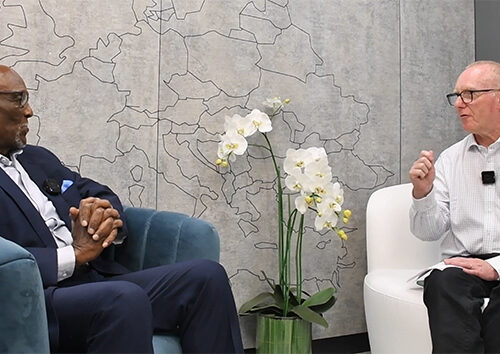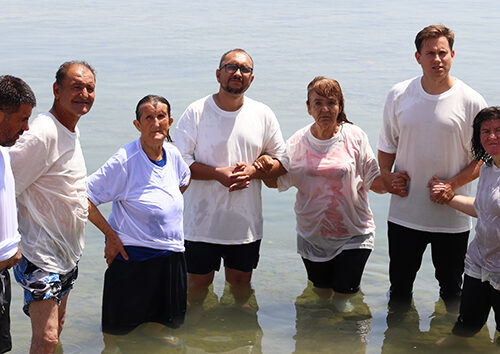21 October 2021 | Tavistock, UK [David Wright]
‘Right here, right now is where we draw the line. The world is waking up. And change is coming, whether you like it or not’, states Greta Thunberg. It seems clear that ecology and environmental action have not only moved to the top of the planet’s agenda, but every inhabitant has to decide whether and how to respond.
!['It's Code Red for humanity', said UN Secretary General, António Guterres [Credit: Jimmy Botha] Glasgow Code Red 500x300](https://ted.adventist.org/sitenews/wp-content/uploads/2021/10/images_Glasgow-Code_Red_500x300.jpg)
-
The last decade was hotter than any period since records began – humans having dumped enough greenhouse gases into the atmosphere to have already heated the planet up to the additional 1.5°C limit set by the Paris Agreement in 2015, and fine-particle pollution from fossil fuels having masked it by providing a cooling effect.
-
Specific weather events can now be directly linked to human activity – or, to quote: ‘It is unequivocal that human influence has warmed the atmosphere, ocean and land . . . and no government has any excuse to duck their responsibility to act.’3
-
The estimated range for how temperatures respond to greenhouse gas emissions has been narrowed, providing a clearer picture of what’s in store if we don’t act quickly.
-
The earth might still reward good behaviour: that is, if emissions cease, heating will cease and temperatures should stabilise in a few decades. Humans, however, are already behind in the race between the avoidable and the unavoidable.
- Consensus exists between scientists and governments that the findings about global warming have been summarised accurately.
 the birth of the modern environmental movement, the influential Ecologist magazine published a special ‘Blueprint for Survival’ edition that drew attention to the urgency and magnitude of environmental problems then facing the world. Over thirty leading scientists of the day argued for radical global restructuring to prevent what they referred to as ‘the breakdown of society and the irreversible disruption of life-support systems on this planet’. Later published in book form, titled How to Save the World, the second chapter read ‘Why the world needs saving now and how it can be done’.4 Yet, despite these early warnings, fifty years later the future of the planet continues to remain in doubt. The theme of this year’s Earth Day was ‘Restore the Earth’, and the November COP26 event is themed ‘Together for Our Planet’. What happens during and after Glasgow is certainly going to demonstrate whether human beings have the capacity and resolve to work together in tackling what is considered the planet’s most critical challenge.
the birth of the modern environmental movement, the influential Ecologist magazine published a special ‘Blueprint for Survival’ edition that drew attention to the urgency and magnitude of environmental problems then facing the world. Over thirty leading scientists of the day argued for radical global restructuring to prevent what they referred to as ‘the breakdown of society and the irreversible disruption of life-support systems on this planet’. Later published in book form, titled How to Save the World, the second chapter read ‘Why the world needs saving now and how it can be done’.4 Yet, despite these early warnings, fifty years later the future of the planet continues to remain in doubt. The theme of this year’s Earth Day was ‘Restore the Earth’, and the November COP26 event is themed ‘Together for Our Planet’. What happens during and after Glasgow is certainly going to demonstrate whether human beings have the capacity and resolve to work together in tackling what is considered the planet’s most critical challenge.- The regulation of the earth’s energy exchange with the sun, designed to keep earth’s temperature at a level supportive of life, protecting life from the sun’s radiation by filtering sunlight through the ozone layer.
- Bio-geological and soil-building processes which cycle oxygen, carbon, water and other vital materials through living things and their habitats and build life-supporting soils and soil structure.
- Ecosystem energy transfer and materials recycling, which energises life and continually allocates life-sustaining resources.
- Water-purification systems which distil, filter, and purify surface and ground waters.
- A biological and ecological ‘fruitfulness’ which supports and maintains a rich biodiversity of life on Earth.
- A global circulation of water and air which distributes moisture, oxygen, carbon dioxide and other vital materials between living systems across the planet.
- The human ability to learn from Creation and live within its laws, making it possible for people to live sustainably on Earth, and so safeguard the creation.
 warnings that relate human conduct with ecological imbalance. The Old Testament writer Jeremiah reported: ‘I looked at the earth – it was a barren waste; …I saw that there were no people; even the birds had flown away. The fertile land had become a desert; its cities were in ruins…’ Isaiah saw something similar: ‘The earth dries up and withers; the whole world grows weak; both earth and sky decay. The people have defiled the earth by breaking God’s laws…’ The apostle Paul describes the situation like this: ‘The whole creation has been groaning… right up to the present time.’7
warnings that relate human conduct with ecological imbalance. The Old Testament writer Jeremiah reported: ‘I looked at the earth – it was a barren waste; …I saw that there were no people; even the birds had flown away. The fertile land had become a desert; its cities were in ruins…’ Isaiah saw something similar: ‘The earth dries up and withers; the whole world grows weak; both earth and sky decay. The people have defiled the earth by breaking God’s laws…’ The apostle Paul describes the situation like this: ‘The whole creation has been groaning… right up to the present time.’7 Seventh-day Adventists have always believed in caring for God’s creation – by advocating a simple, wholesome lifestyle with a plant-based diet, by mostly avoiding the goods-getting consumerism treadmill, by donating time and money to support overseas projects blighted by environmental catastrophes, and by promoting regular connectivity with the natural world. As their name suggests, they also observe their own weekly version of an earth day. Known as the Sabbath, it not only focuses on the creation of the earth and its inhabitants by giving full respect to its Creator God, but anticipates the full restoration of the heavens and the earth in the near future.9 For all delegates to the COP26 conference, and those watching, waiting and hoping for positive outcomes for the planet, they would recommend careful consideration be given to what is written in Acts chapter 4, verse 12.
___________________________________
1UN Secretary General, António Guterres, 9 August 2021., 2Roston and Rathi, Bloomberg Green, 9 August 2021., 3UN IPCC Report, 9 August 2021, 4Robert Allen, 1990, 5Genesis 1:31, NIVUK, 6‘The Care of Creation’, DeWitt, 2000, 7Jeremiah 4:23, 25-26, GNT; Isaiah 24:4-5, GNT; Romans 8:22, NIVUK, 8Revelation 14:6-7, NIVUK, 9Revelation 21.
This article first appeared in a special ‘Code Red’ edition of Messenger, Journal of the Seventh-day Adventist Church in the UK & Ireland. This 29 October 2021 edition includes a series of articles from specialists considering an appropriate Adventist response to current environmental concerns.
tedNEWS Staff: Victor Hulbert, editor; Vanesa Pizzuto, associate editor
119 St Peter’s Street, St Albans, Herts, AL1 3EY, England
E-mail: [email protected]
Website: www.ted.adventist.org
tedNEWS is an information bulletin issued by the communication department of the Seventh-day Adventist Church in the Trans-European Division. Readers are free to republish or share this article with appropriate credit including an active hyperlink to the original article.



